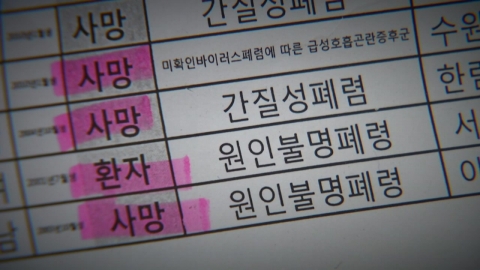□ Broadcast Date: October 28, 2024 (Mon.)
□ Host: Park Gui-bin Announcer
□ Castor: Shin Sang-yeop, Senior Senior Research Fellow, KMI Korean Medical Research Institute
* The text below may differ from the actual broadcast content, so please check the broadcast for more accurate information.
◆ Announcer Park Gui-bin (hereinafter referred to as Park Gui-bin): Wise Radio Life. In this session, we will learn about infectious diseases. It's the latest flu vaccination season. Ahead of winter, when the number of flu patients is the highest, each medical institution is vaccinated against the flu. Today. Let's look into the flu. Shin Sang-yeop, a senior researcher at the KMI Korean Medical Research Institute, is here today as well. Welcome, Commissioner.
◇Shin Sang-yeop, Senior Senior Research Fellow at KMI Korean Medical Research Institute (hereinafter referred to as Shin Sang-yeop): Yes, hello.
◆Park Gui Bin: Yes, the topic of today's infectious disease is the flu. Commissioner, have you ever had the flu?
◇Shin Sang-yeop: Yes. I've been caught once or twice.
◆Park Gui-bin: Is the committee member getting caught, too?
◇Shin Sang-yeop: Even if you are inoculated, you will not be able to prevent it completely. If you keep looking at patients, you're actually exposed to risks, so you can catch it even if you wear a mask and get vaccinated.
◆Park Gui-bin: Yes, flu symptoms are basically very severe when you catch the flu. How is it different from a normal cold?
◇Shin Sang-yeop: Flu and cold are expressed in words like this. Then, we can divide them into invasive or non-invasive. So the influenza virus that causes the flu is the host because the virus itself cannot survive on its own. It enters human cells, especially respiratory epithelial cells, and survives. I hope you survive and come out fine, but this flu virus breaks the epithelial cells. As it comes out, it enters another cell and breaks it again. So, this process progresses very quickly, and usually within 48 hours, all mucosal cells in the respiratory tract are destroyed.
◆Park Gui-bin: That's not the case with a cold?
◇New upper lobe: The rhinoviruses that cause colds and these things infect the upper airways, nose, and pharynx, among respiratory epithelial cells, and they infect and come out finely. I won't break it. Instead, it affects these movements on the mucous membrane, so I just cough, have a sore throat, and it's a cold that ends within a week, but the flu destroys all kinds of epithelial cells, so a person who is suddenly fine with systemic symptoms develops headaches, muscle pain, and fever. But that's not the problem, but the scariest thing about the flu is that all the epithelial cells in the permafrost are broken, and the primary barrier has collapsed. So, few people die from the flu itself, but this barrier is broken, and pneumonia enters the airway between the broken barriers, and all the elderly die from bacterial pneumonia. So what I really emphasize about 48 hours is that if you get treatment, you can prevent them from waking up. Then you'll have a much lower chance of getting pneumonia or secondary complications and more chance of preserving these brain cells, so you'll talk about it later, but when it comes to this flu, treating it quickly is the primary key.
◆Park Gui-bin: I have to go to the hospital quickly for treatment, but if I want to decide that, I have to recognize my symptoms and then notice that it must be the flu. Usually, when you catch a cold, people just don't think it's a big deal. What symptoms should I look at carefully?
◇Shin Sang-yeop: As I said, I don't have the flu, but I just show up like a red bean in the middle of the night. So, I'm doing well in my daily life, but suddenly my fever suddenly rises to 39 degrees and 40 degrees, and my headache and muscle aches are severe. If I recall the old memories, I can't crawl and walk properly. So, there are severe symptoms that make it impossible to go to work at a daily life company, but it's already broken. So, as I said earlier when those symptoms occur, early treatment is very important. Then you go to the hospital to get a diagnosis, and most doctors test for the flu when those symptoms come, so you can get treatment right away at the hospital.
◆Park Gwibin: I see. If you have a high fever, headache, or muscle pain, you'd better go to the hospital right away. Flu vaccinations are being administered right now. Is it the original vaccination period ahead of winter?
◇Shin Sang-yeop: Since the flu vaccine is RNA vaccine, COVID-19 is the same once you get vaccinated. Once inoculated, the effect should be long for 4 months. Cancer is 6 months at the most, so once inoculated before the winter season, the effect does not last more than 6 months. However, considering those things, high-risk groups usually think of October and November as the most appropriate time because it takes two weeks to cover the most dangerous moment.
◆Park Gui-bin: But flu doesn't mean you catch it because you're cold. But why is it popular in winter?
◇New Leaf: Tropical Subtropical Flu is in vogue 24/7. However, in countries where winter and summer are divided, such as Australia and North America and Korea, bacterial growth is active in high-temperature and humid summers, so food poisoning and enteritis occur. However, in a low-temperature and dry environment, the viability of the virus increases very much. So in winter, respiratory viruses such as flu and enteroviruses such as norovirus are prevalent. Norovirus is therefore also called the gastrointestinal flu. So these environmental factors and these things combine to make it popular.
◆Park Gui-bin: I see. Low-temperature drying is a condition that increases virus viability, so it's popular in winter, so you have to get it in autumn before winter. The flu vaccine is now being implemented. There are many types of vaccines. What's the difference?
◇Shin Sang-yeop: In the past, flu vaccines were divided into three or four types, but now they are all four types. No matter what kind of vaccine you get, the vaccines in Korea are tetravalent vaccines with two types of A and B, so you don't have to worry about that, but there are about three types of vaccines you need to pay attention to. One thing is that most ordinary citizens can just get any vaccine on the market. But there are people who are allergic to eggs. According to Ye Jin-pyo, there are people who are allergic to eggs, but for those who are this severe, most of these commercial vaccines grow viruses from eggs, but there are vaccines made by cell culture instead of growing them from eggs. Such a vaccine can be actually inoculated now, so for those people, you can go to a place where you can get a cell culture vaccine and get it. And now in 2023, the Korean Infectious Diseases Association recommended that seniors aged 65 or older be vaccinated with a highly immunogenic vaccine, not to get it. Even with the same vaccination, the effectiveness of the elderly decreases a little and it doesn't last long. So, there are four times more antigens in the highly immune vaccine. In practice, it is known that the preventive effect and the effect of preventing such complications are quite good, so this is non-insurance and you have to pay for it yourself. So, there are those parts, but for real high-risk groups, it's one way to get these immunogenic vaccines, and similarly, there's another vaccine that contains immune boosters. This is also non-insurance and you have to pay it yourself, but it has a very good effect, so when the elderly have the flu, they are often merged into bacterial pneumonia and become very serious. But for those who are at risk, I think it would be better to get vaccines containing these highly immunogenic vaccines or immune boosters rather than just commercial vaccines.
◆Park Gui-bin: This is non-insurance with a highly immunogenic vaccine or boosters. You're getting a free flu vaccine right now. Children aged 13 and pregnant women aged 65 or older are given free flu vaccines, so this is just a regular vaccine, right? So, for high-risk groups, it's better to look for the high-immunogenic vaccine you just mentioned. For those who are allergic to eggs, make sure to tell the hospital your health before getting the flu vaccine. I think it'll be important. And if you caught the flu once last year, you might have caught it, but you might have antibodies. What about those who don't get it?
◇Shin Sang-yeop: As I said, the vaccine's validity period is 6 months and variants continue to occur, so the vaccine that I got last year doesn't have much effect now.
◆Park VIP: You have to get it every year. I see. The listener said, 'Thank you for letting me know about the flu. I heard there are various types of flu, but what if the vaccine I'm getting is not that type of flu? Is there a comprehensive vaccine? ’ This is the question.
◇Shin Sang-yeop: It's a very important question. I told you about the tetravalent vaccine earlier. In our vaccine, there is a virus called influenza, type A, type B, and type C. Of these, only type A and type B cause infections in humans. But there are many of these antigens in type A and there can be many in type B. Type B is usually a single antigen, and type A has many characteristics. But out of these, they decide to get two vaccines from A and two from B and make this vaccine before it becomes popular. So, since there are four types, it is usually covered by the antigens in these four apple vaccines, but there are cases where they are still missing. So, the effect of vaccination is actually very effective every year if the strain fits perfectly, and if it doesn't fit well, the effect decreases a little, leading to a lot of hospitalization.
◆Park VIP: So there may be some gaps. That's what you're talking about. I can cover everything, but maybe not. That's what you're saying. In the case of COVID-19, there is a story that there are some aftereffects left after COVID-19. Is that the case with the flu?
◇Shin Sang-yeop: I think there's something like this. You've never heard of long influenza, but I think many people have heard of long Covid. So, if you do a certain treatment and recover completely, the scar from the treatment situation remains, but there are cases where some infectious diseases look fine after treatment, but they are not. So what you can think of is that there's a thorn in your head. If it's pulled out cleanly on the skin, it'll hurt a little, and it'll become perfect later, right? But some infectious diseases have thorns stuck in them, but the roots don't pull out. From the outside, I don't know. However, the remaining roots in this continue to cause inflammatory reactions, problems, and various events. This is Long Covid right now. So, even after 3 months, there are symptoms like this and that, and in the case of COVID-19, cognitive IQ is lowered and it has various effects on the whole body. It has a mental impact, but those mechanisms have found out that it could last forever. But the reason why this thorn is stuck in it and not pulled out is that the more frequent it is, the more opportunities you will get. So young people recovered well from COVID-19. It doesn't end there. The more you get infected repeatedly, the more likely you are to develop chronic sequelae complications called long-COVID, and it's actually increasing as a result of research. Fortunately, I don't have the flu. However, in the case of COVID-19, these phenomena that remain roots remain, so I think it would be helpful not to get caught as much as possible.
◆Park Gwibin: I see. There are cases of death from the flu, right?
◇Shin Sang-yeop: Yes, there are a lot.
◆Park Gui-bin: Are you going to die because all the barriers I mentioned earlier have collapsed?
◇Shin Sang-yeop: Yes, that's right. In fact, I'm a professional, but I've rarely seen the flu virus spread throughout the body, causing some kind of pneumonia and dying.
◆Park Gui-bin: So the flu virus is not the cause of death?
◇ Shin Sang-yeop: It can be the cause, but in reality, it's the cause-making process. So, when all those cell walls in the respiratory tract are broken, when germs and things eventually enter the lungs, there is no guarantee that the treatment will be perfect for the elderly, so most of the viruses are quickly removed from our bodies within a week or two. In the case of the flu, the elderly are actually advised to get this flu vaccine on time because the respiratory tract of our body and these parts that are damaged by it cannot recover and other infections may occur.
◆Park Gui-bin: I see. Once you have the flu, it's best to treat it quickly and prevent the best thing before all the barriers collapse. That's why we're talking about the flu vaccine, but haven't you died from the side effects after vaccination?
◇Shin Sang-yeop: Well, the flu vaccine is the most popular vaccine in the world every year, so it's proven to be effective and safe. However, even after receiving the flu vaccine, there are cases where severe allergic reactions such as anaphylaxis occur within 30 minutes after vaccination, or neurological complications such as Guillain-Barre syndrome occur weeks after vaccination. In that case, it could actually be a little serious. However, most of them exclude such things, so it is known that there is rarely such a great risk to the flu vaccine itself, so you can get that part with confidence.
◆Park Gui-bin: The listener said, 'The information is amazing that you're growing a vaccine from eggs. ’ For those who are allergic to eggs, you need to check your body. For those who are allergic to eggs, they said there's a cell culture vaccine. Another listener said, "I heard it takes time to get vaccinated and form antibodies. When will the trend peak? ’ How long will it take to form antibodies?
◇Shin Sang-yeop: Basically, RNA vaccines can have a certain level of defense after about two weeks of vaccination. That's why it's better to get it in advance than to get it right away when it's in fashion. In fact, the current flu and COVID-19 are literally trending rather than seasonal. Nevertheless, the virus survives well in winter, so I think it's better to get it right now.
◆Park Gui-bin: Another listener said, 'I have a chronic disease, so I don't get a vaccine if possible, so should I get it? You asked me a question.
◇Shin Sang-yeop: I don't know. Vaccines literally form the body's immunity, don't they? In the end, you have to move away from the pathogen to prevent it. It is described as distancing because the prevention is far away, but there are two types of distancing. One is social distancing, so schools are closed and quarantined, but that's social distancing. I have personal distancing, and these are three. One is wearing a mask, washing your hands, and then removing what's on your vaccination hands with hand washing, and preventing from coming in from outside with a mask, but preventing it from entering our body with a vaccine. So, people who really need this immunity are vaccinated, and you don't have to do it all, so I think you can get the vaccines that each person needs after consulting with the doctor.
◆Park Gwibin: I see. Until now, Shin Sang-yeop was a senior senior researcher at KMI's Korean Medical Research Institute. Thank you.
◇Shin Sang-yeop: Yes, thank you.
[Copyright holder (c) YTN Unauthorized reproduction, redistribution and use of AI data prohibited]
Society
More- I bought a truck crash on the Gyeongbu Expressway.A driver in his 30s dies.
- Overturning a 1t truck on the freeway...a collision with a car that was changing lanes
- Conservative groups rally against impeachment..."Emergency martial law, legal means"
- Ma Yong-joo "Acting President, Constitutional Court Judge for National Assembly"


![[Weather] When the smog is relieved, it's very cold again...Heavy snow on the west coast amid cold weather warning](https://image.ytn.co.kr/general/jpg/2024/1227/202412270105055177_h.jpg)







